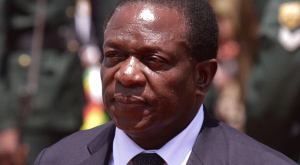
President Emmerson Mnangagwa of Zimbabwe
Harare — Zimbabwe’s economy is projected to contract by up to 6% this year due to a drought that hit farming output and electricity generation but is expected to rebound in 2020 on better agriculture prospects, a treasury document showed on Monday.
Hopes that Zimbabwe’s economy would quickly rebound under President Emmerson Mnangagwa, who took over after the late Robert Mugabe was deposed in a coup in November 2017, have faded fast as citizens grapple with soaring inflation which has eroded earnings and savings.
The national treasury said in a pre-budget planning document that Zimbabwe’s economic problems were being compounded by shortages of foreign currency, fuel and electricity.
“The economy is, therefore, projected to underperform by as much as -3% to -6% in 2019,” the document said, adding that the economy was expected to grow 4.6% next year.
Zimbabwe’s economy is grappling with its worst crisis in a decade, with triple-digit inflation, rolling power cuts and shortages of U.S. dollars, medicines and fuel which have revived memories of the 2008 hyperinflation under Mugabe.
The treasury said the month-on-month inflation rate was projected to fall to around 10% by December this year before easing to 2.3% at the end of 2020.
The government had kept spending in check, the treasury said, and is expecting a budget deficit of up to 4% of GDP this year.





No comments:
Post a Comment